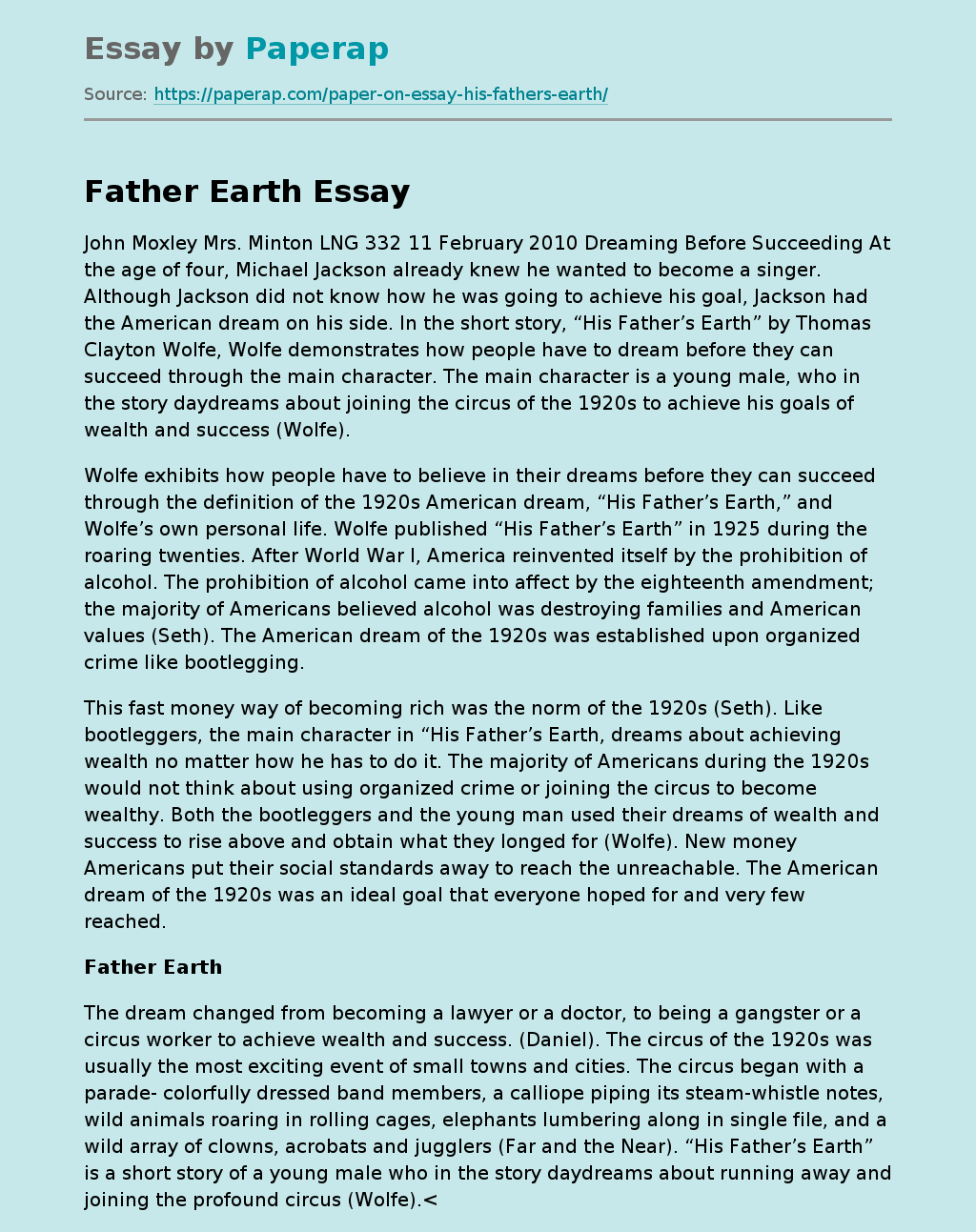Early Dream of Michael Jackson
John Moxley Mrs. Minton LNG 332 11 February 2010 Dreaming Before Succeeding At the age of four, Michael Jackson already knew he wanted to become a singer. Although Jackson did not know how he was going to achieve his goal, Jackson had the American dream on his side. In the short story, “His Father’s Earth” by Thomas Clayton Wolfe, Wolfe demonstrates how people have to dream before they can succeed through the main character. The main character is a young male, who in the story daydreams about joining the circus of the 1920s to achieve his goals of wealth and success (Wolfe).
Wolfe exhibits how people have to believe in their dreams before they can succeed through the definition of the 1920s American dream, “His Father’s Earth,” and Wolfe’s own personal life. Wolfe published “His Father’s Earth” in 1925 during the roaring twenties. After World War I, America reinvented itself by the prohibition of alcohol. The prohibition of alcohol came into affect by the eighteenth amendment; the majority of Americans believed alcohol was destroying families and American values (Seth).
The American dream of the 1920s was established upon organized crime like bootlegging.
This fast money way of becoming rich was the norm of the 1920s (Seth). Like bootleggers, the main character in “His Father’s Earth, dreams about achieving wealth no matter how he has to do it. The majority of Americans during the 1920s would not think about using organized crime or joining the circus to become wealthy. Both the bootleggers and the young man used their dreams of wealth and success to rise above and obtain what they longed for (Wolfe).
New money Americans put their social standards away to reach the unreachable. The American dream of the 1920s was an ideal goal that everyone hoped for and very few reached.
Father Earth
The dream changed from becoming a lawyer or a doctor, to being a gangster or a circus worker to achieve wealth and success. (Daniel). The circus of the 1920s was usually the most exciting event of small towns and cities. The circus began with a parade- colorfully dressed band members, a calliope piping its steam-whistle notes, wild animals roaring in rolling cages, elephants lumbering along in single file, and a wild array of clowns, acrobats and jugglers (Far and the Near). “His Father’s Earth” is a short story of a young male who in the story daydreams about running away and joining the profound circus (Wolfe).
Numerous young Americans of the 1920s fantasized about running away to join the circus; it was the embodiment of fantasy and adventure (Far and the Near). The boy imagined himself joining the circus to sell tickets, put up posters, and barter with farmers for fresh food. Wolfe writes about the boy’s daydream to show that success does not come first without a dream (Wolfe). At the end of the story, Wolfe allows the reader to make a hypothesis that boy follows his dream of the circus, which would lead him to a successful American life.
Thomas Wolfe was born in the smoky mountaintops of Ashville, North Carolina. Wolfe’s large family was not the wealthiest; he was very self-conscious of his family’s wealth, which made him an incredibly studious worker (Seth). At the age of sixteen, Wolfe entered the University of North Carolina at Chapel Hill through a scholarship to study literature. Wolfe’s vision was to become a successful playwright and an author (“Wolfe”). Wolfe’s first completed work was “Look Homeward, Angel” in 1928; the first draft filled up a suitcase of papers.
After several publishers rejected his work and years of dreaming that his day would come, Wolfe finally got his first book published. Wolfe published a very small number of books before his sudden death in 1938. Wolfe died at thirty-eight years old, but before his death, Wolfe left many manuscripts that would later be published (Daniel). Thomas Wolfe’s life exhibits how an ordinary person can achieve his dreams no matter how rich or poor he is. Even though Wolfe died at an early age, Wolfe achieved his goals of being a playwright and an author through hard work.
Thomas Wolfe demonstrates that success does not come before failure and that a person has to believe in his dream before he can succeed. Wolfe exhibits this idea through the definition of the 1920s American dream, His Father’s Earth, and Wolfe’s own personal life. Although Wolfe did not acclaim wealth or fame before his death, Wolfe placed his beliefs in the American society for eternity.
Works Cited Benson, Frederick R. “Wolfe, Thomas Clayton (1900-1938). ” Encyclopedia of World Biography. Ed. Suzanne M. Bourgoin. 2nd ed. Detroit: Gale Research, 1998. 17 vols. Discovering Collection. Gale. Web. 22 January 2010. Seth, John. “Thomas Clayton Wolfe. ” 2005. Web. 20 January 2010. Daniel, Katyhleen, Richard, Sime, and Patricia McCambridge, eds. Elements of Literature. 5th ed. Austin: Holt-Rinehart-Winston, 1997. Print. “The Far and the Near. ” Short Stories for Students. Vol. 18. Farmington Hills: Thomson Gale, 2003. 78-79. Print. “Wolfe, Thomas (Clayton) (1900-1938). ” DISCovering Authors. Online ed. Detroit: Gale, 2003. Discovering Collection. Gale. Web. 20 January 2010. Wolfe, Thomas. “His Father’s Earth. ” 1925. PDF File.
Early Dream of Michael Jackson. (2019, Dec 05). Retrieved from https://paperap.com/paper-on-essay-his-fathers-earth/

